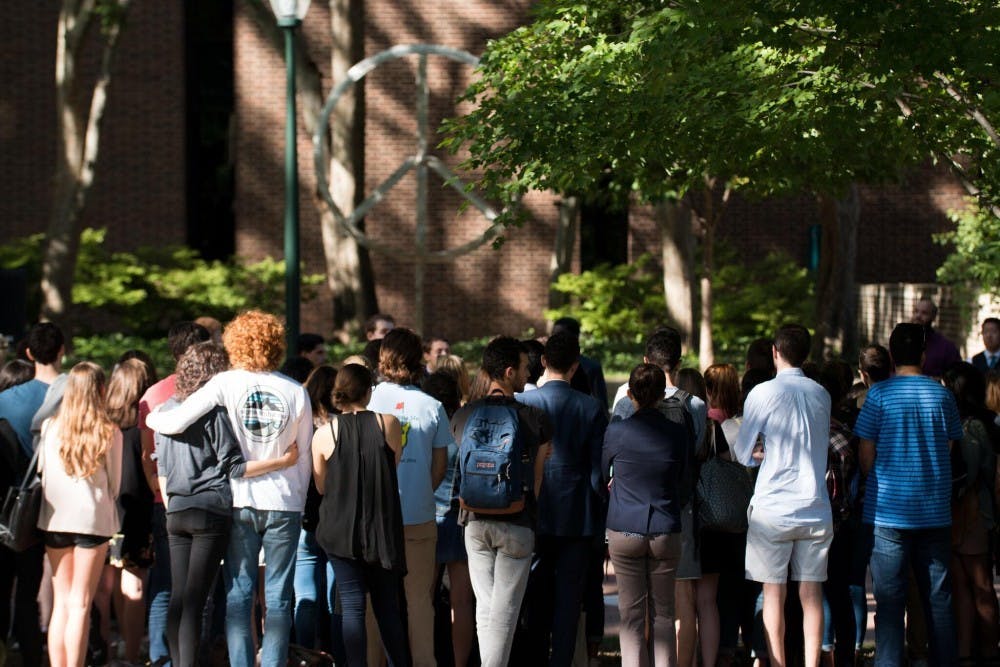
When emotionally stressful incidents strike Penn, student group leaders must try their best to help their members. This often means deciding whether or not to cancel meetings or offer alternative events to support members, as well as negotiating between putting up a strong front or openly discussing their vulnerabilities — all while processing the traumatic news themselves.
College senior and Chi Omega sorority Personnel Chair Carol Sandoval said that in response to student deaths and natural disasters, such as Hurricane Irma, she has held personnel hours for members to speak with her in groups or one-on-one.
When Wharton senior Henry Rogers died earlier this month, Sandoval held personnel hours in place of the sorority’s weekly chapter meeting. Members of Chi O also brought breakfast to the members of Rogers’ fraternity, Beta Theta Pi.
Beta member and Wharton sophomore Emilio Torres-Hamlin said after Rogers’ death, the chapter held a meeting that lasted almost three hours. Many students in the fraternity left campus to spend time together at a member’s house and scheduled social events in the following weeks were canceled.
Torres-Hamlin said spending time with other members during that period was extremely valuable.
“It’s very difficult dealing with something like that by yourself, having to deal with it internally,” he said. “But when you’re with a group of people like that, we were with each other for days on end, and it was just really helpful.”
International Affairs Association board member and Wharton junior Matt Simon said his fraternity, Sigma Alpha Mu, rushed to support Beta members after Rogers’ death. Members of Sigma Alpha Mu, known as “Sammy,” delivered flowers to the Beta house.
Earlier in the semester, College senior Nicholas Moya, who was a member of Sammy, died by suicide in his residence off campus.
"If any group is going to be there for [Beta], it should be [Sammy]," Simon said.

After Moya’s death, the Sammy house was filled with alumni and current members, but Simon said it was important for him to reach out to IAA members who were also affected. The IAA board decided to reach out to younger members offering support, but did not change its meeting schedule.
College junior Max Schechter, a peer counselor for student-run counseling group Penn Benjamins, said maintaining a regular meeting schedule following a traumatic event can help students maintain a sense of normalcy.
“In times of tragedy, it’s important for student groups to acknowledge it, but also to have a sense of normalcy,” he said. “If everything was canceled after a tragedy, I don’t know how much easier that would make it. A lot of times, people like to cope by distracting themselves and student groups and being involved in your passions is a great way to do that.”
Student leaders said they also reach out after events that might make members feel uncertain or fearful.
Sandoval, who was the chair of admissions for the Latinx Coalition last year, said that cultural groups had a strong reaction to an incident in November 2016 when black freshmen students were added to a GroupMe that contained racially explicit threats.
“As one of the sister cultural houses in ARCH, La Casa Latina was very supportive and we hosted several workshops on how to combat these issues and how to be there for one another as people of color,” Sandoval said. “As minorities on this campus, it was very important to show that solidarity within our communities."
The GroupMe incident came only days after the 2016 presidential election, when President Donald Trump’s upset victory over Hillary Clinton shocked many at Penn and elsewhere. In the days following Trump’s victory, some professors canceled classes and postponed exams — many expressing concern for students’ mental and physical well-being after a long, drawn-out election night.
Queer Student Alliance Communication Chair and College sophomore Amber Auslander said after the election, QSA held an extended discussion on how the Trump administration’s policies “could affect individual lives going forward.”
Payal Sharma, a visiting lecturer in the Wharton School who studies how stressors impact leaders and teams, said leaders should talk with members about what they would find most helpful, and emphasized the value of “cultivat[ing] meaningful, genuine ties.” Sharma added that leaders should consider the signals they send to members after difficult events.
“Sometimes I think the broader question becomes, ’What do we expect of our leaders?’” she said. “Do we want them to be strong and fearless when it comes to these events and the aftermath? But then I think, on the other hand, do we want our leaders to be bulletproof and to convey that we can continue as if everything’s fine? And I don’t know that it’s an either/or decision — I think it might be a balance of both.”
“I tend to think that there’s some value in leaders accepting their own vulnerability," she said. "That’s how you form a connection to other people, and maybe that’s how you offer support.”
CAMPUS RESOURCES
The HELP Line: 215-898-HELP
Counseling and Psychological Services: 215-898-7021 (active 24/7)
Student Health Service: 215-746-3535
Office of the Vice Provost for University Life: 215-898-6081
University Chaplain’s Office: 215-898-8456
Reach-A-Peer Helpline
- 215-573-2727 (every day from 9 p.m. to 1 a.m.)
- 215-515-7332 (texting service available 24/7)
Penn Benjamins (in-person peer counseling)
- Su, M, T 8-11 p.m. Harnwell Library First Floor
- W, Tr 8-11 p.m. Houston Hall Chaplains Office
The Daily Pennsylvanian is an independent, student-run newspaper. Please consider making a donation to support the coverage that shapes the University. Your generosity ensures a future of strong journalism at Penn.
Donate







